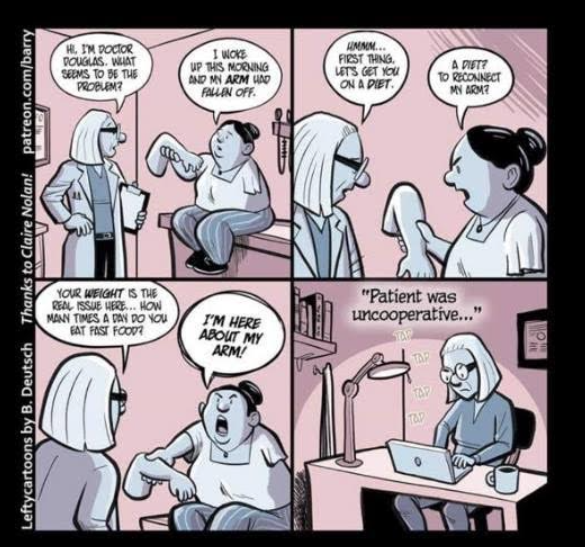Arm Off, Told to Diet: Why Weight-Neutral Healthcare Matters.

Imagine walking into a doctor’s office with a genuine concern, perhaps even something as stark as a limb injury, only to have your very real symptoms dismissed with the suggestion: “Just go on a diet.” While it sounds like a darkly humorous cartoon, this experience, or variations of it, is tragically not far from the reality many of you have faced. At Laneways Rehab, I’ve listened to countless heartbreaking and deeply frustrating conversations with individuals who have navigated healthcare in a larger body. These stories underscore a critical, often unspoken, truth: every single one of you deserves respectful, weight-neutral healthcare, where your experiences are validated, and your health is prioritised, regardless of your body size.
The Real Impact of Weight Stigma: Your Stories, Our Shared Understanding
The comic strip’s absurdity highlights a painful truth that many of you live daily. The experiences my patients have shared, navigating the healthcare system when living in a larger body, have been both heart-breaking and profoundly eye-opening. These aren’t isolated incidents; they’re systemic issues that affect countless individuals just like you.
One patient, bravely opening up about her struggle with endometriosis, recounted her visit to a specialist. She described a doctor who avoided eye contact, offering only two solutions for her debilitating symptoms: lose weight or have a baby. At just 20 years old, and already trying to lose weight without any genuine support or guidance, she was left feeling utterly dismissed and hopeless. This profoundly negative encounter tragically led her to avoid seeking healthcare for a decade, until her symptoms became so severe she required hospitalisation. Her story is a stark reminder of the long-term cost of feeling unheard.
Another patient shared the devastating story of her mother. After years of belittling and dismissive experiences within the healthcare system, her mother eventually stopped seeking treatment altogether. When antibiotics for chronic kidney infections upset her stomach, instead of feeling safe enough to voice her concerns and ask for alternatives, she quietly ceased taking them. The infection eventually spread, and she passed away. This poignant account highlights how, when you don’t feel safe or respected enough to speak up, the consequences can be truly dire.
These are just some of the profound ways weight stigma in healthcare impacts your experiences, sometimes with devastating and irreversible consequences. Your stories are not just anecdotes; they are crucial evidence of a system that often fails to serve those who need it most.
Empowering Your Journey: Tools for Self-Advocacy
Witnessing these struggles, some of my patients have developed powerful strategies for self-advocacy – a skill you shouldn’t have to develop, but often must. One courageous woman shared that she consistently asks her healthcare provider: “Is this the same treatment you would recommend for your own mother?” Another bravely enquires if it’s the same treatment they’d offer to slimmer patients. I firmly believe these questions are crucial. They compel clinicians to think beyond assumptions based on appearance and apply the same, high standard of care to everyone.
Over time, many of you learn to navigate these challenging situations, but the reality remains: seeking medical help can still feel fundamentally unsafe. This should never be the case. Every single patient deserves to be treated with unwavering respect, dignity, and the best possible care, regardless of their body size. Your worth and your health are not determined by a number on a scale.
The Path Forward: Embracing Weight-Neutral & Inclusive Care
As healthcare providers, we have a profound responsibility to develop the skills necessary to assess and support you based on your overall health, not merely your body size. It is absolutely essential to respect your choice to live at the body size you choose. If you express a desire to pursue weight loss, healthcare providers should recommend evidence-based strategies to support that goal, free from judgment or coercion. Ultimately, it’s about delivering truly individualised care that takes your whole person into account – your history, your preferences, and your goals. Our commitment at Laneways Rehab is to provide body positive physio, ensuring you feel heard, respected, and receive truly individualised care. This holistic approach aligns with the core principles of weight-neutral healthcare.
Seeking Truly Inclusive Physiotherapy Care? You Deserve It.
At Laneways Rehab, we believe every body deserves respectful, dignified, and effective care. If you’ve experienced weight bias in healthcare or are simply looking for a clinic that prioritises your overall health and well-being, we’re here to listen, to validate your experiences, and to provide truly patient-centred support.
Professional Development Resources for Healthcare Providers
If you’re a healthcare provider looking to enhance your skills in providing equitable care to patients of all body sizes, I encourage you to check out the following professional development opportunities:
- World Obesity Federation SCOPE Training Learn how to offer a comprehensive approach to obesity management and care.
- Melbourne University Obesity Management Training A well-rounded programme for those looking to expand their understanding and support of patients living with obesity.
- Professional Development with Laneways We offer tailored training and program development support. Please reach out to discuss.
By investing in your own education, we can collectively shift healthcare toward better, more inclusive practices for everyone.
